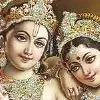The word Jogi is a regional corrupted form of the word Yogi. Jogan is the female form for the word jogi. Yogis are of many types. There are those who deny the body its comforts and those who give the body its basic needs like food, clothing and shelter and contemplate on the "higher" levels of existence. And there are more types. The Gita talks of four types of yogas one could adopt to experience the world and beyond- karma (yoga of action), gyana (of knowledge), bhakti (of devotion) and raja (royal secret).
To write off Radhika as a Jogan who will never come back to Dev is not true. A jogan is a sincere seeker who wants to contemplate about what life is and where the individual fits in the bigger picture (call it divine will if you wish). And where better to do this soul searching than in a serene atmosphere of an ashram where she can choose the relationships she wants rather than be handed a bunch of relationships that the "outside" world has thrust on her.
This will be a pivotal point (if the creative are doing the right thing, that I suspect they are doing) where Radhika's character will be finally established. Now, when she goes back into the world, she will not be "shaken" by people's opinions or expectations of her. She will stand up for what her truth is and that truth which she will discover is that Dev is like air and she breath, that he is chandan (sandalwood) and she water... (Prabhuji tum chandan mein pani, tum moti hum dhaga, tum sona hum suhaga...type.)
As she was never given an opportunity to contemplate thus, she should use this time wisely and hopefully the Guru will also guide her and clear some of her confusion and clarify the silly actions she has taken like renouncing her love for Dev for Vishaka's sake. She can renounce Dev's love for a "higher" calling like Kanha, but not for a selfish brat like Vishakha, there is no jan kalyan (good for the world) in that act.
Jogan need not be confused with the vows of becoming a nun. While jogans do swear a life of celibacy (which Radhika already is in spite of being married!), it is not an immutable change. She can always go back to the "sansar" (material world) where relationships do matter- but with the wisdom that all that is mithya (illusion).
The beauty about Hindu dharma is that in the varnashrama dharma, each group of people with their respective occupations have 4 distinct phases to experience- one of bachelorhood and celibacy (brahmacharya), of marriage and responsibility (grihasta), of retirement and wisdom (vanaprasta) and finally of renunciation (sanyasa). A jogan is not necessarily to be interpreted as a sanyasi (renunciate) who takes diksha from the guru to leave behind the sansar.


































